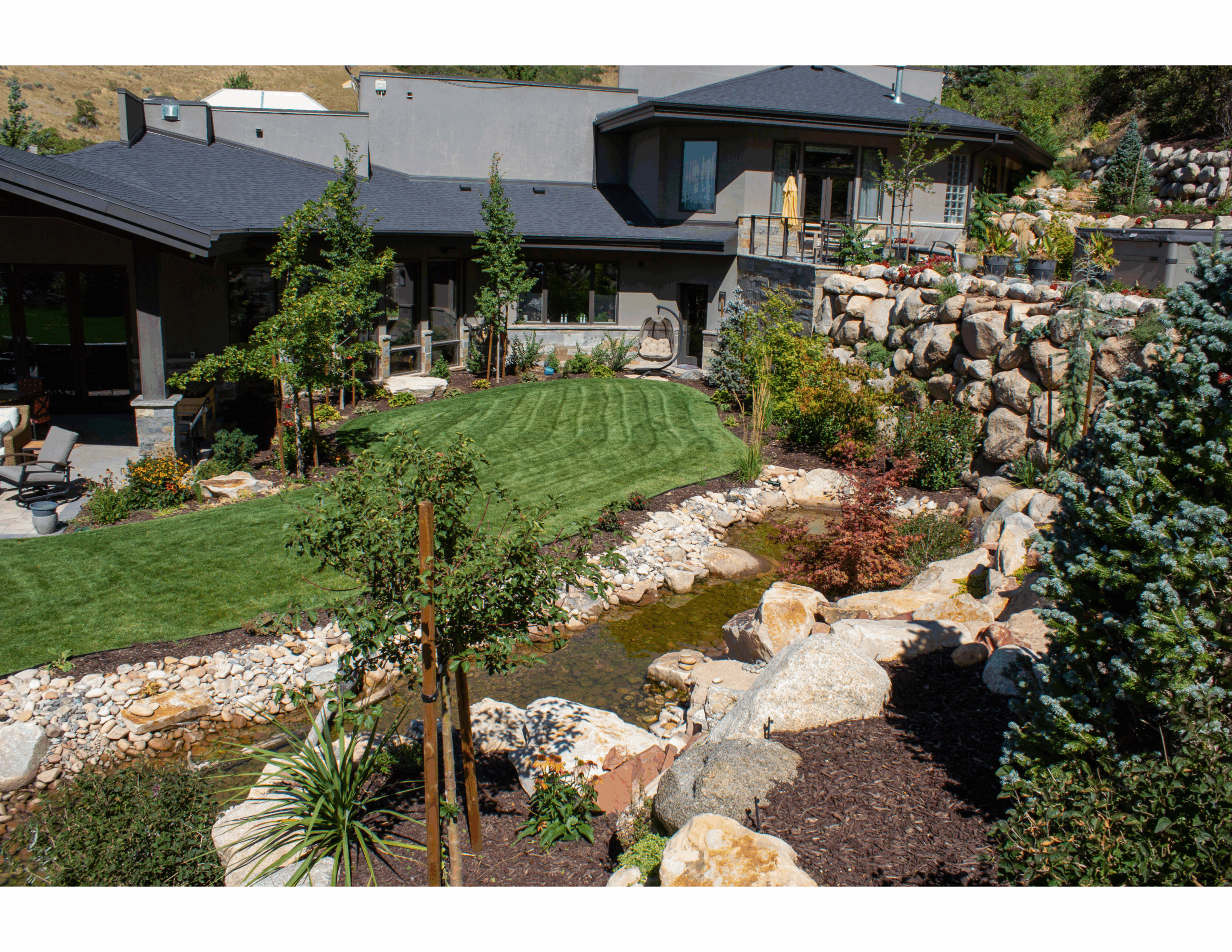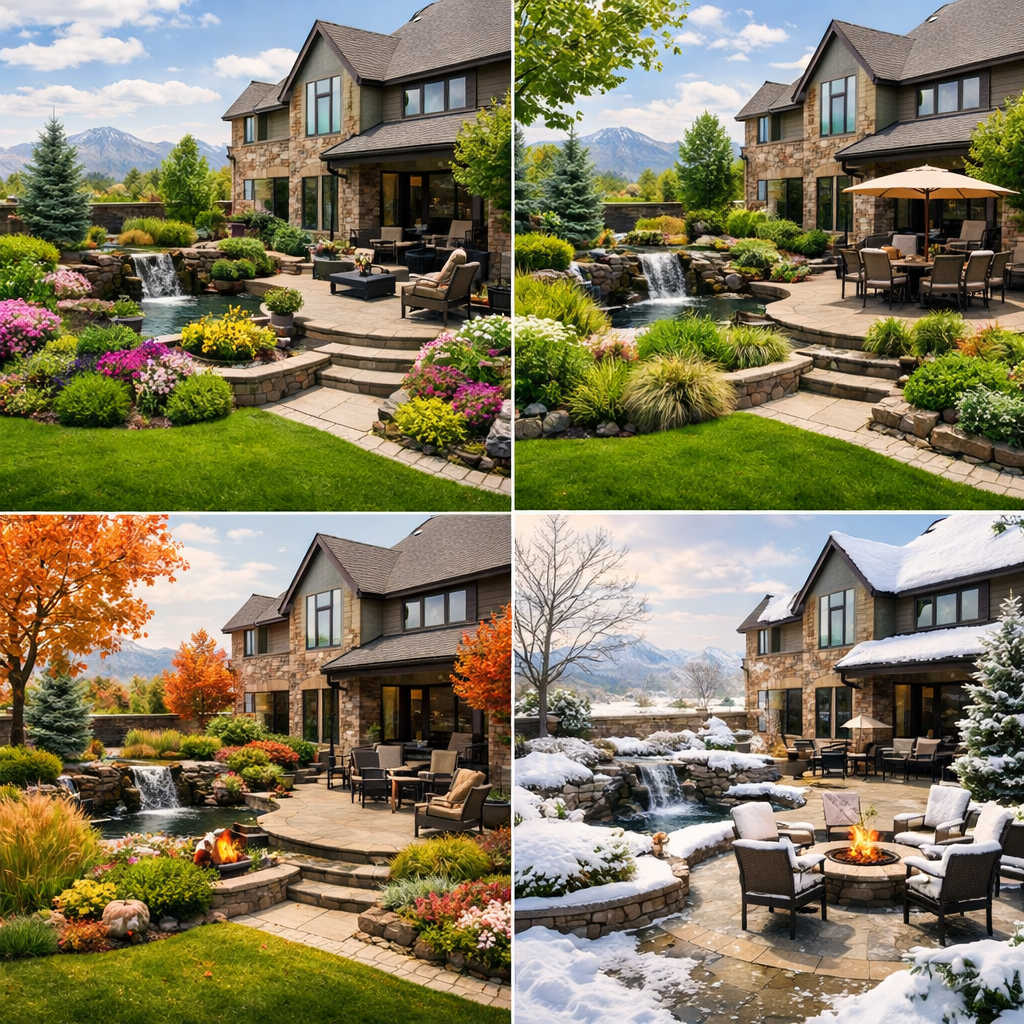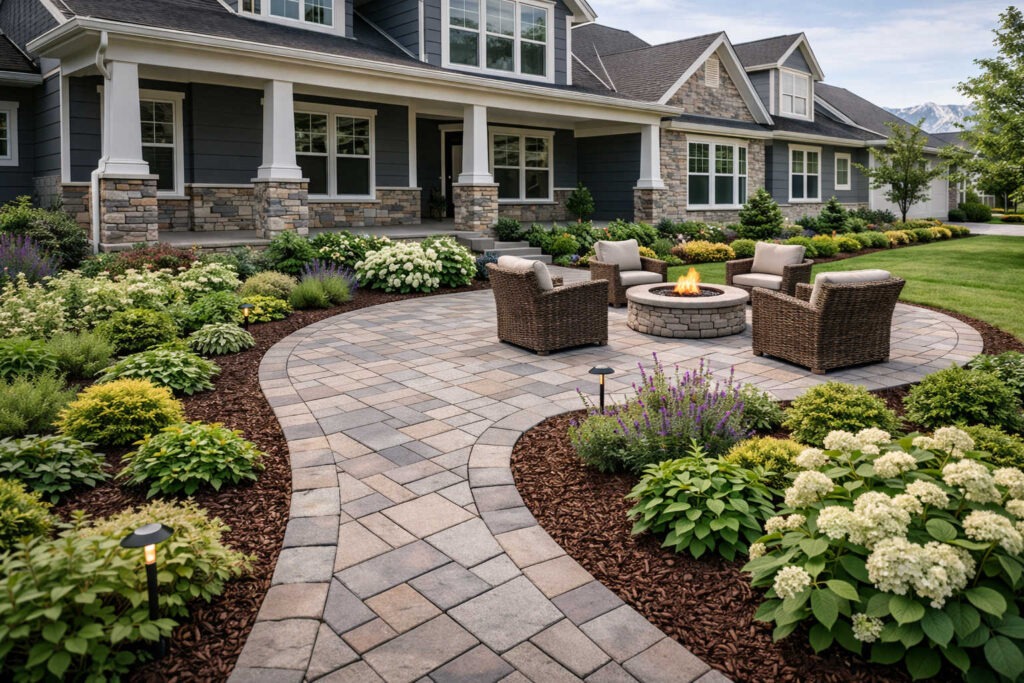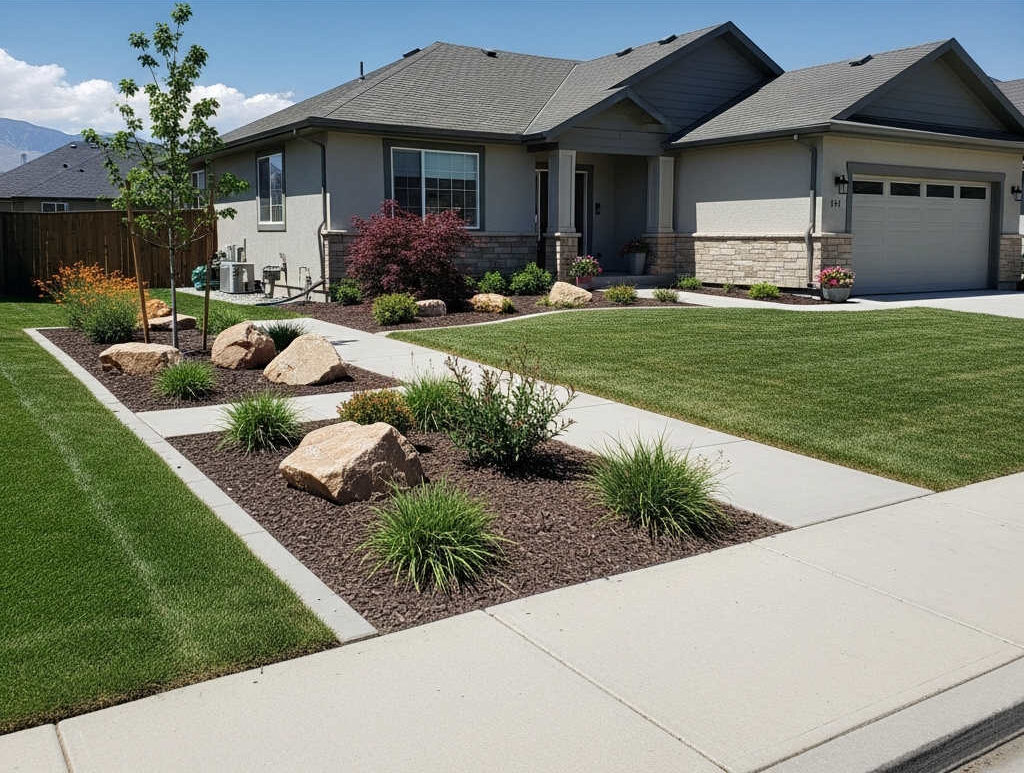Why Sustainable Landscaping Is More Than Just a Trend
As climate concerns grow and water resources become increasingly precious, homeowners across Salt Lake City are embracing eco-friendly garden design as a meaningful way to reduce their environmental footprint while creating more resilient outdoor spaces. These sustainable landscapes aren’t just good for the planet—they offer practical benefits including reduced maintenance requirements, lower water bills, and enhanced property values.
The most successful eco-friendly gardens seamlessly blend environmental responsibility with beautiful aesthetics, proving that sustainability and style can coexist harmoniously. Whether you’re redesigning an established landscape or starting fresh, incorporating sustainable practices creates a garden that’s both visually appealing and ecologically sound.
Understanding the Principles of Sustainable Landscape Design
Working With Nature, Not Against It
The foundation of eco-friendly landscaping lies in understanding and working with your site’s natural conditions rather than fighting against them. Professional landscape designers begin this process by:
- Conducting thorough site analyses to identify existing drainage patterns
- Mapping microclimates created by buildings, established trees, and topography
- Assessing soil composition and health through comprehensive testing
- Identifying native plant communities that naturally thrive in similar conditions
When you schedule a consultation with an experienced ecological landscape designer, they’ll help you recognize your property’s inherent strengths and challenges, forming the basis for a design that requires fewer inputs and interventions.
Minimizing Resource Consumption
Truly sustainable landscapes dramatically reduce the ongoing resources required for maintenance and care:
- Water conservation through appropriate plant selection and efficient irrigation
- Reduced or eliminated chemical inputs by building healthy soil ecosystems
- Decreased fossil fuel usage by minimizing lawn areas requiring frequent mowing
- Lowered embodied energy through thoughtful material selection and sourcing
A professional landscape service with sustainable expertise can help you identify specific strategies to reduce your garden’s resource requirements while enhancing its beauty and functionality.
Essential Elements of Eco-Friendly Garden Design in Salt Lake City
Water-Wise Landscaping Strategies
In our semi-arid mountain climate, water conservation represents the cornerstone of sustainable landscape design. Modern eco-friendly gardens incorporate sophisticated water management through:
- Hydrozoning: Grouping plants with similar water requirements
- Rain gardens and bioswales that capture and filter stormwater
- Permeable hardscaping that allows water to infiltrate rather than run off
- High-efficiency drip irrigation systems with smart controllers
Professional landscape designers can create a comprehensive water management plan that reduces consumption by 50-70% compared to conventional landscapes while maintaining visual appeal throughout the seasons.
Native and Climate-Adapted Plant Selection
The most resilient and low-maintenance sustainable landscapes feature plants well-suited to Salt Lake City’s unique growing conditions:
- Native Utah plants evolved to thrive in our specific environment
- Drought-tolerant species that require minimal supplemental irrigation
- Habitat-supporting varieties that attract beneficial insects and birds
- Diverse plant communities that resist pests and disease naturally
When you work with a knowledgeable landscape professional, they can help you select a plant palette that delivers year-round interest while requiring minimal inputs—a key component of truly sustainable garden design.
Building Healthy Soil Ecosystems
The foundation of any thriving eco-friendly garden lies below the surface in the soil ecosystem. Sustainable landscape practices focus on:
- Comprehensive soil testing to understand existing conditions
- Appropriate amendments using organic materials
- Minimal soil disturbance to preserve beneficial organisms
- Continuous mulching to build soil health over time
Professional landscape services include soil improvement strategies tailored to your specific site conditions, creating the healthy foundation needed for plants to thrive with minimal intervention.
Reducing Lawn Areas Strategically
While lawns offer practical recreational spaces, conventional turf requires significant resources to maintain. Eco-friendly landscapes take a balanced approach by:
- Limiting turf to areas where it serves a functional purpose
- Selecting drought-resistant grass varieties appropriate for our climate
- Incorporating alternative groundcovers for low-traffic areas
- Implementing organic lawn care practices that build soil health
When you engage a sustainable landscape designer, they can help you determine the ideal balance of lawn and garden areas for your lifestyle needs while minimizing environmental impact.
Materials and Practices for Sustainable Hardscaping
Environmentally Responsible Material Selection
The hardscape elements in your garden offer opportunities to make environmentally sound choices:
- Locally sourced stone and materials that reduce transportation impacts
- Permeable paving options that manage stormwater effectively
- Reclaimed or recycled materials that minimize extraction impacts
- FSC-certified wood and sustainable alternatives for structures
Professional landscape designers can introduce you to innovative sustainable materials that deliver both environmental benefits and striking aesthetics for your outdoor spaces.
Energy-Efficient Outdoor Lighting
Modern eco-friendly landscapes incorporate thoughtful lighting strategies that:
- Utilize high-efficiency LED fixtures for minimal energy consumption
- Implement strategic lighting design to reduce light pollution
- Incorporate solar options where appropriate
- Include sophisticated controls for operation only when needed
A sustainable landscape design service can develop a lighting plan that enhances your garden’s evening enjoyment while minimizing energy usage and environmental impact.
Creating Wildlife Habitat in Your Sustainable Garden
Supporting Pollinators and Beneficial Insects
Eco-friendly gardens play a crucial role in supporting declining pollinator populations through:
- Diverse flowering plants that provide nectar and pollen throughout the growing season
- Host plants that support the complete lifecycle of butterflies and moths
- Reduced or eliminated pesticide use to protect beneficial insects
- Water sources and habitat features that attract and support diverse species
When you schedule a consultation with a wildlife-friendly landscape designer, they can help you incorporate specific plants and features that transform your garden into a thriving ecosystem.
Bird-Friendly Garden Features
Sustainable landscapes provide essential habitat for our feathered friends through:
- Layered plantings that offer nesting sites at various heights
- Native plants producing seeds and berries for natural food sources
- Water features designed with bird bathing and drinking in mind
- Protection from predators through thoughtful design
Professional landscape services can integrate specific bird-supporting features that enhance both ecological value and your enjoyment of wildlife in your garden.
The Process: Creating Your Sustainable Landscape
Eco-Friendly Design Development
The journey toward a sustainable landscape begins with thoughtful planning and design:
- Comprehensive site analysis identifying opportunities and constraints
- Collaborative goal-setting balancing environmental priorities with lifestyle needs
- Conceptual designs exploring spatial relationships and flow
- Detailed planting and hardscape plans specifying sustainable solutions
By investing in professional ecological landscape design services, you ensure that sustainability principles are integrated from the very beginning rather than added as an afterthought.
Sustainable Installation Practices
The installation phase presents numerous opportunities to minimize environmental impact:
- Careful protection of existing trees and vegetation
- Minimal soil disturbance and compaction during construction
- Responsible waste management and recycling
- Proper plant installation techniques ensuring long-term health
When you work with landscape professionals experienced in sustainable practices, their installation methods themselves reflect the ecological values underlying your project.
Establishing Care Routines
The early maintenance period establishes patterns for long-term success:
- Appropriate irrigation scheduling that encourages deep root growth
- Organic fertilization only when indicated by soil testing
- Mulching practices that build soil health and conserve moisture
- Mindful pruning that respects natural plant forms
Professional landscape maintenance services can help establish sustainable care routines and provide guidance as your eco-friendly garden becomes established.
Investment Considerations for Eco-Friendly Landscapes
While sustainable landscapes often require thoughtful initial investment, they typically deliver significant long-term savings:
- Water savings: 50-70% reduction compared to conventional landscapes
- Maintenance reduction: 25-60% less time and expense for ongoing care
- Increased property value: 5-15% premium for well-designed sustainable landscapes
- Long-term durability: Properly selected plants and materials require less replacement
Professional landscape designers can help you understand the return on investment timelines for specific sustainable features, allowing you to prioritize improvements with the greatest ecological and financial benefits.
Common Myths About Eco-Friendly Garden Design
Myth #1: Native Plant Gardens Look Messy and Unkempt
Reality: Contemporary ecological design incorporates native plants in aesthetically pleasing arrangements with clear structure and organization. Professional designers understand how to create orderly, visually appealing compositions using native and adaptive plants.
Myth #2: Sustainable Landscapes Are Expensive to Install
Reality: While some sustainable features require initial investment, many eco-friendly approaches actually reduce costs. Limiting lawn areas, selecting appropriate plants, and using localized materials often result in lower installation expenses compared to conventional landscapes.
Myth #3: Eco-Friendly Gardens Don’t Look Good Year-Round
Reality: Properly designed sustainable landscapes incorporate diverse plant selections providing visual interest across all seasons. Professional landscape designers with ecological expertise carefully select plants for succession blooming, interesting seed heads, winter structure, and seasonal color changes.
Frequently Asked Questions
Q: Is sustainable landscaping more expensive?
A: Initial costs can vary, but long-term savings on water, maintenance, and chemicals make it cost-effective.
Q: Which plants work best for Salt Lake City’s climate?
A: Native plants like sagebrush, yarrow, and blue flax are ideal for low-water, high-impact gardens.
Q: How do I maintain an eco-friendly garden?
A: Focus on seasonal mulching, efficient watering, and organic pest control. Partnering with a local sustainable landscaping service simplifies upkeep.
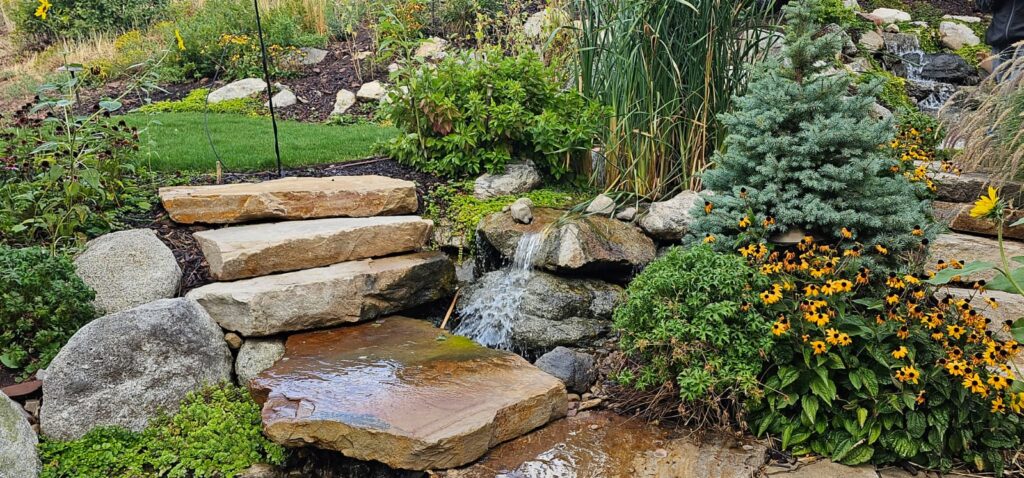
Ready to transform your Salt Lake City yard into a sustainable oasis?
Our team specializes in eco-friendly garden design tailored to Utah’s unique climate. From drought-resistant layouts to pollinator-friendly plantings, we’ll help you create a landscape that’s both stunning and sustainable.

